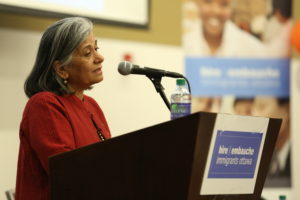WATCH: Confronting Hiring Bias – A discussion with the Honourable Ratna Omidvar
 The business case for immigration has never been more pressing as Canada’s labour market intersects with an aging population. Though Canada’s immigration imperatives focus on attracting economic migrants, labour market integration strategies will have to be examined as skilled migrants in Canada’s labour market continue to face barriers to employment.
The business case for immigration has never been more pressing as Canada’s labour market intersects with an aging population. Though Canada’s immigration imperatives focus on attracting economic migrants, labour market integration strategies will have to be examined as skilled migrants in Canada’s labour market continue to face barriers to employment.
On January 25th, a dynamic group of city builders gathered at University of Toronto’s Munk School of Global Affairs to discuss issues of hiring bias. The event followed the release of a new report called “Do Large Employers Treat Racial Minorities More Fairly?” co-authored by Rupa Banerjee, Jeffrey G. Reitz, and Phil Oreopoulos. Among the report highlights is the experience of discrimination that is revealed by comparing the success of applications from job-seekers with Anglo-sounding names (Greg Johnson, Emily Brown) with Canadian qualifications, Asian-sounding names with Canadian qualifications (Lei Li, Samir Sharma) and Asian-sounding names with foreign qualifications. The evidence is unequivocal: the report sampled nearly 13,000 applications for over 3,000 jobs in Toronto and Montreal. Even when applicants have the same Canadian qualifications, Asian-named applicants have a 32.6% lower rate of selection for an interview compared to Anglo-named applicants. No surprise, then, that experiences of discrimination are more likely to occur when Asian-named applicants also have foreign credentials. Worrisone in today’s entrepreneurial economy, evidence suggests that discrimination may be even more prevalent amongst smaller organizations, partially due to a lack of resources for advanced HR practices. No matter, discrimination can occur at at almost any stage of one’s employment including wages and opportunity for promotion.
Read the full article on Cities of Migration’s website.
Watch a video of the discussion below.